A few months before she is due to vacate her office, Europe’s top antitrust watchdog is going into battle again. EU Commission Vice President Margrethe Vestager announced on Monday a fine of 1.84 billion euros against the tech group Apple for alleged violations of competition rules in the music streaming market. This corresponds to 0.5 percent of Apple’s global annual sales. “Apple’s rules have harmed consumers,” said Vestager, referring to the requirements for developers in the iPhone manufacturer’s app store. Apple “withheld important information about prices and features of services” from them.
The decision is the latest in a long series of proceedings by the Commission against large American tech companies. In the almost ten years of her work in Brussels, Vestager has taken on almost all of them, including Google’s parent company Alphabet, against which she imposed fines of more than eight billion euros in three cases. So now Apple, for the first time in a competition case. And not because the company is said to have abused its market power against competitors – but against iPhone users, whose choices Apple is restricting at a crucial point, according to the commission.
The case began in 2019 with an official complaint from Spotify and has a lot to do with Apple’s logic, according to which iPhone and iPad users become part of a largely closed system. All devices work seamlessly with each other, but the company also collects sales from as many places as possible. Anyone who wants to offer their apps and services on Apple’s platforms, such as the App Store, regularly pays a fee to Apple. The commission accuses the company of having unfairly exploited this in the case of music streaming apps. Apple has banned app developers from “fully informing about alternative and cheaper music subscription services” that are available outside of the app, the authority said.
Basically, users can choose between different ways if they want to take out a subscription: If they do it within an app, billing is done via the App Store, including the fee to Apple. You can also easily take out a subscription on the provider’s website.
The Commission accuses the company of using so-called anti-steering provisions to conceal these options. “For a decade, Apple has prevented music streaming app developers from informing their customers about cheaper options outside of the app,” Vestager said. App developers should not have informed their users about other ways to subscribe within an app, nor about the price differences – because so-called in-app purchases via the app store are often more expensive because of the fees.
Apple argues that Spotify is now becoming even more powerful
Now another peculiarity of this case is that Spotify does not offer in-app purchases at all in order to avoid having to pay the usual App Store fee of 30 or 15 percent of sales to Apple. That’s why the actual fine for anti-competitive behavior is small at 40 million euros. The Commission is imposing the larger part, 1.8 billion euros, as a lump sum: This should have a deterrent effect; it reflects both Apple’s financial strength and the “immaterial damage” to millions of European users, said Vestager.
There is no such damage, Apple contradicts. The company considers the procedure to be contrived, and corporate lawyers were irritated a few days ago after via Financial Times The first indications of the impending fine had become known. Apple refers to Spotify’s contacts with the Commission since 2015, which were intended to initiate possible proceedings against Apple.
For a long time it was about Apple allegedly hindering competition in the market for digital music streaming. As a result, the Commission “constructed” three different cases. Eight years of investigations have produced no valid theory “that could explain how Apple would have hindered competition in a market that is so obviously growing,” Apple said, pointing to Spotify’s role as the world’s dominant streaming provider with a 56 percent market share. “Ironically, today’s decision in the name of competition only cements the dominant market position of a (…) company,” writes the company in an unusually open manner.
From the Commission’s point of view, Apple is missing the point. “This case is essentially about the anti-steering provisions, which were non-negotiable,” said Vestager, i.e. about the fact that app developers were not allowed to fully inform their customers within the app. In addition, the company’s objections were taken seriously. “But that didn’t completely convince us,” said Vestager.
Apple is now expected to take action against the decision. This seems to mean that it will only be clear at the end of years of legal proceedings who will win in this case. Just like in numerous tax and competition proceedings against the big names in the tech world from California, which are currently still pending. A large part of Vestager’s legacy will be decided by the EU courts in Luxembourg – and others will probably negotiate it if the Social Democratic-led government in Copenhagen does not propose the liberal Dane as Commissioner again in the summer.

